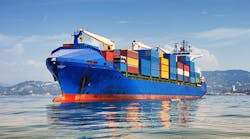On May 23, the International Maritime Organization (IMO) issued a memo stating that countries take a “practical and pragmatic approach” to enforcing the SOLAS Container Weight Verification Requirement for three months after July 1, 2016, when the regulation is scheduled to go into effect. With the entire global export industry already teeming with analyses of the regulation, what exactly does this memo mean? Here are answers to some of the questions raised by the international trade community.
How are countries to interpret the updated requirement?
With the IMO memorandum MSC.1/Circ.1548, ocean trade has received clarification on several topics regarding the SOLAS Container Weight Verification Requirement. For example, the notice has clarified that a Verified Gross Mass (VGM) is unlikely to be required for transshipments (the shipment of goods via an intermediate location) in transit before July 1.
In addition, the notice affirmed that the container weight requirement is not the only aspect of safety for vessels and ocean shipments. Stability requirements, for example, reach back to the original International Convention for the Safety of Life at Sea (SOLAS) Requirements from 1974, and multiple subsequent regulations and amendments remain in effect.
As for the “practical and pragmatic approach” to enforcement, the notice refers to a sense of flexibility, specifically as it relates to information sharing. Our view is that the three-month transitional period allows organizations further time to refine the communication of a VGM. It is not, however, a softening or more lenient interpretation of enforcement.
What is happening on July 1 now? On October 1?
The enforcement regulation is still in the hands of individual nations. Despite the call from IMO for flexibility, many carriers and countries keep saying there will be no exceptions, even if the publication of the legislation takes place after July 1.
The October 1 date is noted as the closure date on any flexibility that may be allowed. At that time, it can be interpreted that full enforcement will begin as specified in the original regulation. It is also important to note that if a country has not published national legislation on the subject, the SOLAS amendment is still in force.
Do existing regulations cover container weight?
Most requirements talk about the weight of the cargo, for example in customs declarations. What is new, however, is that the full container weight is required and this needs to be verified. Previous SOLAS regulations already address the importance of a container weight.
Why is verifying a total weight important?
Container stack collapses, vessel instability, injury to dock and vessel workers, damage to cargo, stress to ships and port machinery, insurance claims, added costs, and significant environmental impact have added to the urgency for an accurate weight. With an estimated 10% of shipments citing an inaccurate weight (source: Loadstar), the potential for an incident is substantial. As a result, the SOLAS requirement was implemented as a condition to load marine cargo into a ship.
In addition, as ocean vessels increase in size, the need for an accurate weight is intensifying due to the scale of a potential incident. In today’s modern, multimodal container ports, incorrect weights can also ripple into the rail and truck modes of transport as cargo is transferred to its final or intermediate destination.
Why can’t the industry easily comply with what seems like a simple mandate?
This is a substantial change for ocean trade. From calibration of weighing equipment, how cargo should be weighed, when weighing should occur in the supply chain, and even simple variances in humidity, a number of factors are at play. Additionally, at a practical level, although the shipper needs to use the correct tare weight of the container, not all containers have the same weight. In theory, the weight stated on the door of the container should be used; however, there is no single database that contains all tare weights, although some carriers provide information tables for their own containers.
How are individual nations and regions reacting to the update?
Most authorities have the same level of urgency as before to the May 23 memo, and the World Shipping Organization has been tracking the progress of each nation. Some nations have issued comprehensive guidelines while others have not issued any advice or a simple analysis. Agencies such as the United States Coast Guard have noted that existing U.S. laws are equal to the requirements under this SOLAS amendment, adding further confusion. In some locations, the trend is to weigh containers at the port. Again, it is important to note that the IMO update does not reduce the urgency of compliance.
What authority does the IMO have to issue a regulation?
Over 171 nations are signatories to SOLAS. In general, the SOLAS regulations are seen as global standards to regulate the safety of vessels for the benefit of all participants.
Will the industry accept each other’s communications?
To communicate VGM information to carriers, an electronic data interchange (EDI) message has been developed called the Verified Gross Mass (VERMAS) message. This is the preferred communication protocol of many carriers, freight forwarders and shippers since this format was designed to contain all of the required information, including optional fields.
The advantage of this methodology is to minimize the impact to the existing communication of shipping instructions. This is essential since, in many cases, existing messages are sent too early or too late for transmission of the VGM. In order to leverage VERMAS details, and its reply communication from carriers and NVOCCs called the Application Error and Acknowledgement (APERAK) message, a system translator must parse the transmission. The VGM closing date is also added to the booking confirmation message.
Since the regulation does call for substantial changes, many shippers and intermediaries are seeking a single source for integration, rapid deployment, standardized support, increased visibility, transparency and reuse of information.
Need more info? Visit Descartes’ Resource Center and eBook for additional information on the SOLAS VGM requirement.
Eric Geerts is director of product management for Descartes, a provider of on-demand, software-as



